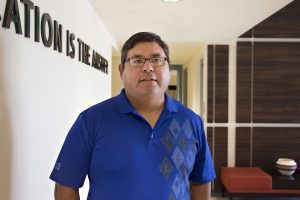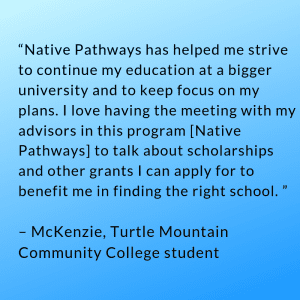
The demand for a college degree in the workplace is increasing, putting Native Americans at a disadvantage. With only 13.8 percent of American Indian and Alaska Natives age 25 and older holding a bachelor’s degree, the American Indian College Fund (College Fund), a national nonprofit headquartered in Denver whose tagline is “Education is the answer,” knew we had to do something to increase the number of Native college graduates.
College Fund, the oldest scholarship provider for American Indians, knew that it was not enough to only provide scholarships. To ensure student success we needed to create paths to college by helping students consider their career options with their families, then take the necessary high school coursework to lay the foundation for college success while in high school and during their college years.
With the College Fund’s Native Pathways to College Program, Native students and families receive assistance creating and navigating a path to college. And once students are in college, the program gives them training and tools to earn an associate’s degree and then to choose a four-year institution where they can earn a bachelor’s degree.
 The Native Pathways to College Program has four components: the High School Admissions Pathway, College Readiness Bridge, the First Year Experience Pathway, and the Tribal College Transfer Pathway. Over a two-year period we have served more than 1,500 high school and tribal college transfer students through the Native Pathways program.
The Native Pathways to College Program has four components: the High School Admissions Pathway, College Readiness Bridge, the First Year Experience Pathway, and the Tribal College Transfer Pathway. Over a two-year period we have served more than 1,500 high school and tribal college transfer students through the Native Pathways program.
Under the High School Admissions Pathway, students receive one-on-one coaching and participate in workshops to prepare them for college. They also receive opportunities to visit campuses, participate in college fairs, and get valuable information about tuition, financial aid, and the admissions process.
The Native Pathways to College program funded four Tribal Colleges and Universities (TCUs) to implement a year-round college-readiness program. The TCUs work with area high school students to develop a college-going environment all year through summer programs and school year workshops. In addition, some of the bridge programs offer dual credit and high school retrieval credit.
After students are enrolled in their first year of college, coaches provide individualized support for students under the First Year Experience Pathway. Students learn how to build successful study habits, set academic and career goals, and gauge their academic progress in the short and long-term while building a sense of community. All of these skills work together to ensure long-term success.
Tribal college students graduating with an associate’s degree who want to earn a bachelor’s degree are also eligible to participate in the Tribal College Transfer Pathway. Students attend personal coaching sessions and receive assistance in applying to higher education institutions with competitive admissions requirements. They receive valuable information about how to choose a college or university that provides Native students with additional scholarships, tuition-waivers, and in-state tuition. They also learn which schools offer a comfortable and welcoming environment for Native students which is essential to their academic and emotional well-being.
The Tribal College Transfer Pathway program also helps transfer students to make campus visits. When living on remote, rural reservations, many students cannot afford to make the long trip for a campus visit. By providing transfer students with this opportunity, the program allows them to make informed choices about furthering their education.
All participants in The Native Pathway to College Program receive ongoing phone support, mentoring, access to informational interviews, and social media updates about important information to ensure their success.
The Native Pathway to College Program is the first of its kind in Native communities and has already made a difference in the lives of students. A future initiative to look for from Native Pathways is a college-going guidebook for American Indian/Alaskan Native students. We know our students want to go to college and our aim is to provide support to help them navigate the college going process.
Matthew Makomenaw, an enrolled member of the Grand Traverse Bay Band of Ottawa and Chippewa Indians tribes of Michigan, is the College Pathways Manager for the American Indian College Fund. He has experience providing college access and retention for American Indian students in higher education. Makomenaw holds a doctorate degree in Higher, Adult, and Lifelong education from Michigan State University, where he completed his dissertation on the success of tribal college students transferring to four-year predominantly white institutions.
